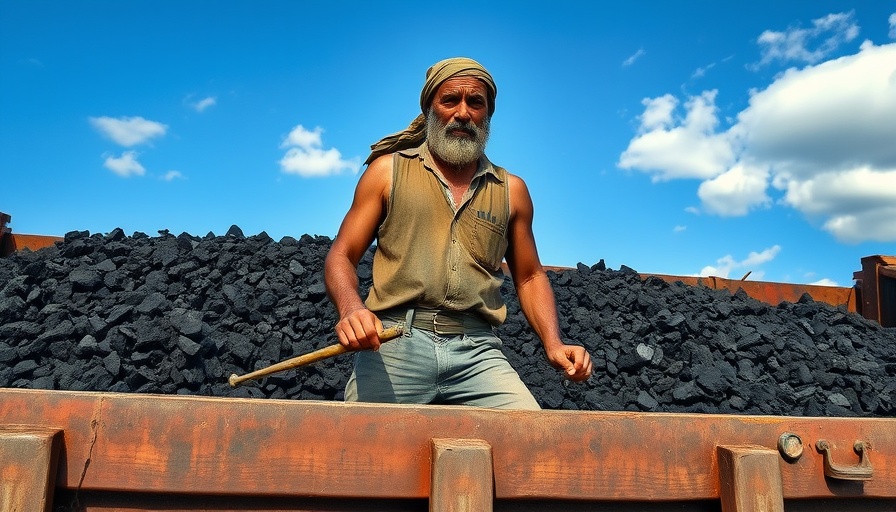
India's Robust Coal Industry: A Turnaround Story
The landscape of India's coal industry is witnessing a significant transformation as the nation’s leading coal producer reopens dozens of mines. This ambitious move signals not only a recovery from previous setbacks but also a commitment to bolstering the economy amidst evolving energy demands. With growing reliance on coal for electricity generation, India's coal champion aims to meet the surging energy needs of the country’s burgeoning population.
Exploring the Economic Impacts of Coal Mine Reopenings
The reopening of these mines brings with it a wave of economic positivity. The coal sector, which has historically been a cornerstone of India’s economy, contributes to a significant number of jobs. As the mines restart operations, thousands of workers are set to return to their jobs, helping reduce unemployment and stimulating local economies. This resurgence may also have a ripple effect on related industries, including transportation and construction, invigorating business in regions that heavily depend on coal mining for their livelihoods.
The Role of Coal in India's Energy Agenda
Coal remains an integral part of India’s energy strategy, providing over 70% of the country’s electricity generation. The reopening of coal mines aligns with the government’s plan to ensure energy security while transitioning towards more sustainable energy sources. While debates around the environmental impacts of coal mining continue, the immediate necessity to secure energy for businesses and homes is a pressing concern that the government must address while balancing ecological considerations.
Corporate Responsibility and Sustainability Efforts
As the industry rebounds, there’s an increasing focus on corporate social responsibility (CSR) within leading coal companies. This entails adopting more sustainable practices and engaging local communities in discussions about economic impacts. Companies are being challenged to improve environmental standards, reduce carbon footprints, and explore cleaner technologies. As India progresses toward its climate goals, the coal industry must play a pivotal role in integrating sustainability into its operations.
Market Trends and Future Predictions
The reopening of coal mines could significantly influence market dynamics within the Indian economy. Analysts predict that these developments may enhance investor confidence, particularly in sectors such as energy and infrastructure. Additionally, the potential for mergers and acquisitions in the coal and energy sector could accelerate. Startups focusing on renewable energy technologies may look for partnerships or expansions fueled by the growing coal infrastructure until renewables can be scaled effectively to replace fossil fuels.
Challenges and Counterarguments
While the reopening of coal mines seems promising, it’s essential to recognize the counterarguments. Environmental activists and renewable energy proponents argue that an overreliance on coal could hinder India’s progress towards cleaner energy solutions. The pressing challenge facing policymakers is how to balance economic growth with environmental stewardship. It’s crucial to engage stakeholders from various sectors to develop comprehensive strategies that encourage responsible energy sourcing while meeting economic objectives.
How Businesses Can Adapt and Thrive
Businesses can capitalize on the evolving scenario in India’s coal industry by aligning their strategies with emerging trends. Local enterprises can look at opportunities in the supply chain logistics of coal transportation or in sustainable technologies that could help mitigate the environmental impacts of mining operations. Additionally, fostering partnerships can lead to knowledge sharing and innovation that enhances operational efficiency.
A Call to Consider: The Future of Coal in India
As we reflect on the implications of India’s coal industry reopening, it’s essential to consider how these developments will shape the future of energy in the nation. Stakeholders, from policymakers to entrepreneurs, should engage in dialogue about the direction of energy policy and business strategies. Understanding the challenges and opportunities ahead will be crucial for businesses looking to navigate this complex landscape effectively.
In conclusion, while the resurgence of coal mining in India represents a significant economic opportunity, it also demands a balanced approach towards sustainability and community involvement. Individuals and businesses alike should explore innovative ways to contribute to a more sustainable energy future while tapping into the economic potential of the coal industry.
 Add Row
Add Row  Add
Add 



Write A Comment